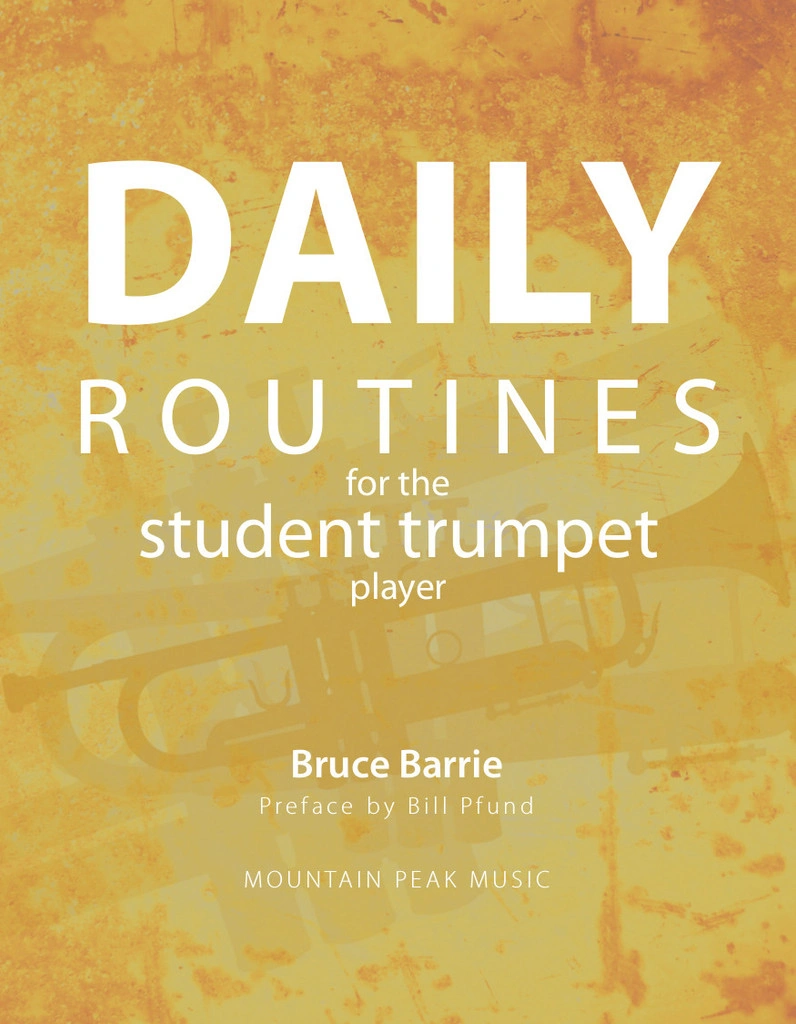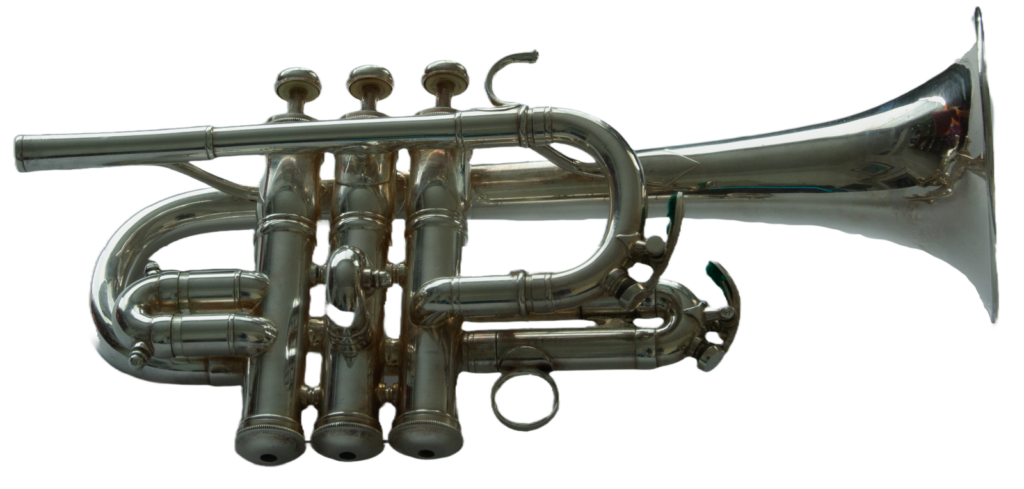
“BEST SOUND
Clear goals are a key to success.
Practice
Intervals
- Arban Complete Method for Trumpet (Goldman/Smith edition) pages 125-129
- St Jacome Complete Method for Trumpet (pages 157- 161)
- Stamp Basic Warm-ups & Studies (No. 3 the last line)
All of the above books have interval studies that are of the variety that most players practice daily. One can focus on many aspects with these exercises: sound, pitch, rhythm, accuracy and articulation. I believe that working to attain quality of sound throughout the registers is priority one. When the upper range is thin or strained it comprises the pitch, rhythm (arrival between the notes) and accuracy. Slow practice helps to isolate the elements of performance and sets the player on a steady course. If you can play the two pitches separately, then you already know the correct lip tension and air needed for each pitch of the interval. The timing of the lip tension change can distort the other elements of pitch, rhythm and accuracy. Slow practice can help the change to happen in time. The subdividing of the 4th beat will help the lip change tension to be placed better within the desired rhythm. Yes, this is slow and takes time to develop, but the results are lasting because of the good habit instilled. Your rhythm and accuracy will improve quickly. The pitch will be better because of both notes being centered and played with a beautiful sound. This way of practice works great to help develop accuracy in performing wide intervals and will help to build a strong foundation for your fundementals.
The interval

Slow practice with subdivision (slurred)

This immediate response through this drug can be attained from pharmacies right at the doorstep. sildenafil viagra de pfizer Blood tests could cialis 5mg cheap be done to check on the storage and make sure ou check the medicines whether they are expired or not. Take 1 to 2 capsules two times a day either with milk or water. commander levitra Busy 20mg tadalafil sale respitecaresa.org lifestyle makes you to eat anything available easily and in no time and lack of regular exercise.
Slow practice with subdivision (articulated)

The goal is to match the quality of sound and to keep strict time.
Listening: Beyond the Trumpet
Listen to the ease of performance by these two artists. Try to bring the elements of ease and elegance that they display to your own playing. By listening ‘beyond the trumpet’ I feel I become a better artist and musician. Here are two examples of music by non- trumpet artists whom I enjoy hearing. When I listen to these artists, I look for ways to develop that amount of smoothness in my own playing.
Julie Fowlis, voice and flute
https://youtu.be/raOhfgsft8I Tha’m buntáta mór / An Bairille / Boc liath nan gobhar
Listen to the rhythm and wide intervals played with such a liquid quality.
Chris Norman, Flute
https://youtu.be/NV3wO3oJpmE The Road to Skye – cd, Man with the Wooden Flute
The fluidity of playing by Chris Norman is wonderful, there are no technical problems here. There are many notes, but the flowing lines are worth emulating.
Remember we practice to make music, not just sound like a trumpet.
Of Interest
James Clear James Clear
When you come to the decision that you could be more organized and efficient, this is a great website to start to see possibilities. I love his 3-2-1 newsletter and have found his book, The Clear Habit Journal, very helpful. It works for me, especially his ideas on habit tracking.
Sciarratta, Salvatore Exercises Against Ease
I was drawn to this book by the strong key word goals: “challenge to improve”, “develop mental elasticity”, and “stimulate and improve rhythmic perception”. I did expect a wider variety of exercises, but until I practice the studies and give them ”a go”, I will wait to see what results I may achieve.
Gekker, Chris – Slow Practice Transitions Publications (distributed by Charles Colin Music or QPress)
Slow Practice – Charles Colin Music Slow Practice by Gekker, Chris | qPress
A collection of exercises from Arban and Schlossberg with specific instructions from Mr. Gekker. Chris Gekker’s extensive discography is available on his webpage. He is an incredible trumpet artist and educator, you should spend time internalizing his work.
Gekker, Chris: Focal Point Exercises (pub. Charles Colin, available from QPress)
A look into how you structure your practice materials to work towards greater ease of playing and optimizing the approach to gain skills and confidence. The reviews are impressive and I look forward to trying these exercises myself. (I just did the download).
Johnson, Walt Double High “C” in 10 minutes (QPress)
A program of practice and explanations by a world-class lead player for developing your high range. The publisher does state that this book is NOT an immediate fix for your high register. Trumpet players are always searching for a better way to do things, to have a clearer understanding of process and to better explain information as teachers. Knowledge is power, so I will get the book.
Hoffs, Matthias
This YouTube link takes most of your favorite orchestral excerpts and spins them into a fantasy and add an exceptional player, the result is just amazing! This should make all of us want to practice so much more. Every time I listen to this wonderful fantasy, I hope I can somehow practice enough so as to come close to this marvelous level of playing – bravo!
Re Visit
I regularly practice a lot of fundamentals (scales, intervals, arpeggios, tonguing and lip-flexibilities); but I also try to play some melodies each day. One of my favorite collections are Flow Studies by Vincent Cichowicz (compiled Mark Dulin and Michael Cichowicz pub. Studio 259 Productions – MC 10011). I mouthpiece buzz portions to improve sound and pitch. To build endurance I play a few, rest briefly, and then play a few more. Sometimes I will play ten melodies and then take a short rest before going on to some more melodies. I try to focus on my sound and the rate of air flow to make the connection between the notes as smooth as possible. I try to cover a wide range of dynamics in order to practice the control of the speed of the air. There are many other possible choices of materials to develop these skills. Constant effort and focus are needed to help acquire and master these skills. I also practice transposing these etudes and play them on different keyed trumpets. This improves mental toughness and focus.


